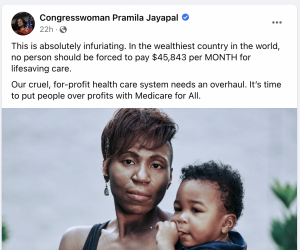 Vision of a New Way (VNW) would welcome any opportunity to review “overhaul” of our country’s health care system. VNW has been an advocate for improved access to care, improved affordability, improved health in general and longer life expectations for more than twenty years.
Vision of a New Way (VNW) would welcome any opportunity to review “overhaul” of our country’s health care system. VNW has been an advocate for improved access to care, improved affordability, improved health in general and longer life expectations for more than twenty years.
Furthermore, there is no need for the “Build Back Better Bill.” The reason, an annual reduction in health care spending of an estimated $1.5 trillion through hospital organizations’ compliance with Centers for Medicare & Medicaid Services (CMS) policy and Internal Revenue Code (IRC) § 501(r) – implementation of “Medicare for All.” (Ref: “Hospitals Stand to Lose Billions Under ‘Medicare for All) (See: Additional Information) (See: Website)
“Medicare for All” has become a political catchphrase. You used it in your Facebook response to the KHN article: A hospital offered a payment plan for baby’s NICU stay — $45,843 a month for a year.
This is absolutely infuriating. In the wealthiest country in the world, no person should be forced to pay $45,843 per MONTH for lifesaving care.
Our cruel, for-profit health care system needs an overhaul. It’s time to put people over profits with Medicare for All. (Emphasis added) (Yes, it is time.)
Secretary Tommy Thompson’s Letter
In an exchange of letters, February 19, 2004, with Richard J. Davidson, President, American Hospital Association (AHA), then Secretary Tommy Thompson (R), U.S. Department of Health & Human Services (HHS), directed hospital organizations “to take action to assist the uninsured and underinsured.” The Secretary’s guidance to the AHA: “work with… member hospitals to develop and utilize an “indigency policy.” An indigency policy. – means-test uninsured and underinsured obligors as to their financial ability-to-pay the hospital organization’s charges and not be forced into “medical indigency.”
Your letter suggests that HHS regulations require hospitals to bill all patients using the same schedule of charges and suggests that as a result, the uninsured are forced to pay “full price” for their care. That suggestion is not correct and certainly does not accurately reflect my policy. The advice you have been given regarding this issue is not consistent with my understanding of Medicare’s billing rules. To be sure that there will be no further confusion on this matter, at my direction, the Centers for Medicare & Medicaid Services and the Office of Inspector General have prepared summaries of our policy that hospitals can use to assist the uninsured and underinsured. This guidance shows that hospitals can provide discounts to uninsured and underinsured patients who cannot afford their hospital bills and to Medicare beneficiaries who cannot afford their Medicare cost-sharing obligations. Nothing in the Medicare program rules or regulations prohibit such discounts. (Emphasis added)
With this guidance as a tool, I strongly encourage you to work with AHA member hospitals to take action to assist the uninsured and underinsured and therefore, end the situation where, as you said in your own words, “uninsured Americans and others of limited means are often billed and required to pay higher charges.”
Centers for Medicare & Medicaid Services Summary:
Questions On Charges For The Uninsured
Q1: Can a hospital waive collection of charges to an indigent, uninsured individual?
A1: Yes. Nothing in the Centers for Medicare & Medicaid Services’ (CMS’) regulations, Provider Reimbursement Manual, or Program Instructions prohibit a hospital from waiving collection of charges to any patients, Medicare or non-Medicare, including low-income, uninsured or medically indigent individuals, if it is done as part of the hospital’s indigency policy. By “indigency policy” we mean a policy developed and utilized by a hospital to determine patients’ financial ability to pay for services. By “medically indigent,” we mean patients whose health insurance coverage, if any, does not provide full coverage for all of their medical expenses and that their medical expenses, in relationship to their income, would make them indigent if they were forced to pay full charges for their medical expenses.
Ref: What is “Medicare For All? Margot Sanger-Katz | New York Times | June 9, 2021
Medicare for All: a business model where-in hospital organizations are reimbursed (compensated) for their goods and services using Medicare rates. Medicare reimbursement rates are generally 50% – 80% of gross charges (i.e., “chargemaster” rates), therefore, the cost of providing health care goods and services would be reduced substantially. The real-world impact on hospital organizations; it is generally agreed amongst the experts their revenue would be reduced by 40%, in dollar terms $1.5 trillion annually.
Ref: “Hospitals Stand to Lose Billions Under ‘Medicare for All” Reed Abelson | New York Times | April 21, 2019
Or take another example: One hospital would get about $4,200 from Medicare for removing someone’s gallbladder. The same hospital would get $7,400 from commercial insurers.
The yawning gap between payments to hospitals by Medicare and by private health insurers for the same medical services may prove the biggest obstacle for advocates of “Medicare for all”. … (it is not an issue for advocates but surely for hospital organizations)
If Medicare for All abolished private insurance and reduced rates to Medicare levels — at least 40 percent lower, by one estimate — there would most likely be significant changes throughout the health care industry. …
CMS Policy:
Deciphering CMS’ Policy and Accounting Legalese
What is an indigency policy? It is means-testing uninsured and underinsured obligors as to their financial ability-to-pay the hospital organization’s charges and not be forced into “medical indigency.”
What is charity care? It is the value of medical expenses that exceed the obligor’s financial ability-to-pay the hospital organization’s charges so as to not cause the obligor being rendered medically indigent.
What is medical indigency? It is when an obligor’s health insurance coverage, if any, does not provide full coverage for all of their medical expenses and that their medical expenses, in relationship to their income, would make them indigent if they were forced to pay full charges for their medical expenses.
Under CMS policy uninsured and underinsured obligors of limited means are obligated to pay the hospital organization only an amount not exceeding the obligor’s financial ability-to-pay so as to not cause the obligor being rendered medically indigent – pay only an amount the obligor can afford. Any charges (medical expenses) exceeding an obligor’s financial ability-to-pay is “charity care” and should be treated as such for accounting purposes, and from a morality standpoint, to protect obligors from being rendered “medically indigent.”
Under CMS policy there is no such thing as “medical debt” – let me repeat the facts (the truth). Any hospital organization’s charges (medical expenses) exceeding an obligor’s financial ability-to-pay so as to not cause the obligor being rendered medically indigent is “charity care.” Simply stated, obligors of limited means do not owe the hospital organization any amount they cannot afford.
Our country’s hospital organizations have failed to implement indigency policies; the facts are irrefutable: “nearly 70% of individuals filing for personal bankruptcy cite medical debt as the reason.” (this should not be occurring) How many obligors of limited means just endured? How many obligors of limited means did not seek care as a result of the hospital organizations’ failing to comply with CMS policy?
Existing Technology
The determination, decisioning, of the amount an obligor can afford can be accomplished in seconds at admission. To eliminate conflicts of interest and protect stakeholders the decisioning should be accomplished by an independent third-party credit expert. The experts employing today’s credit management technology to achieve transparent, objective, and replicable decisions. Such technology is common and has been used by lenders for decades. A specific decisioning algorithm can be implemented at an individual hospital, city, county, or state level.
Thank you in advance for your work on behalf of our country (Chair: Congressional Progressive Caucus, U.S. House of Representatives), and your Washingtonian constituents, stay healthy & best regards,
/S/
Roger Berliner
Advocate
Vision of a New Way
1063 Snowdon Ct
Asheboro, NC 27203
336-672-1230 Office
336-460-0330 Cell
roger.berliner@visionofanewway.org
Additional Information:
The State of North Carolinas Hospital Organizations Failing to Provide Discounted or Free Care

